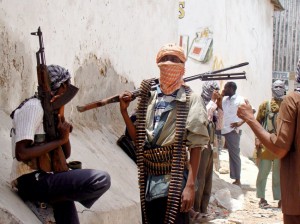“Bring Back Our Girls” protests have drawn international attention to the abduction of school girls from Chibok Government Girls’ Secondary School in Borno State by the Boko Haram Islamist militant group. The governments of the U.S., the U.K., France, China, and Israel have sent military and counterinsurgency teams to aid Nigeria in its fight against Boko Haram. Despite the recent counter offensives launched in cooperation with international forces and the surfacing of local vigilante groups, the Islamic militant group continues to operate successfully in the outlying areas of Borno State by rapidly adapting its tactics. The group has effectively targeted outlying villages and gained control of crucial access points throughout the State.
-
Boko Haram soldier On May 7, Boko Haram militants attacked Gamborou Ngala town, located on the border between Cameroon and Nigeria, in the Ngala Local Government Area (LGA) of Borno State, reportedly killing 300 locals. Meanwhile, a further attack was recorded on the same day in Askira LGA where an additional 125 civilians were killed.
- Citizens of Rann town in the Kala-Balge Local government Area (LGA) in Borno State repelled a Boko Haram attack on May 13, reportedly killing 200 militants.
- On May 17, Boko Haram militants killed at least 29 civilians in a market located in Ngurosoye Village, Bama Local Government Area (LGA), 56 kilometers from Maiduguri, in the northeastern Borno State. In addition, 40 civilians were killed a result of a further attack in the village of Dalwa-Masuba in the Damboa Local Government Area (LGA) of Borno State on the same day.
- According to Amnesty International, Boko Haram attacks were responsible for over 1,200 deaths in 2013. An Amnesty report issued on March 30 of this year reports that at least 1,500 have been killed in Boko Haram-related violence in the first three months of 2014 alone.
Assessments: International assistance unlikely to significantly mitigate further attacks by the militant Islamist sect, as it continues to rapidly adapt its tactics to increased counterinsurgency efforts
- Despite the recent enhancements of counterinsurgency measures by Nigerian security forces aided by increased international assistance, the military has recorded few successes against Boko Haram militants. However, several recent attacks have been foiled by local vigilante groups, who have increased their activism due to frustration with the perceived incompetence of Nigerian security forces.
- President Jonathan’s acceptance of foreign military cooperation may enhance the response to the Boko Haram threat faced by the northeastern provinces of Borno, Adamawa and Yobe. The increased surveillance and intelligence operations in cooperation with foreign military and anti-insurgency teams and increased vigilante activism are likely to limit Boko Haram’s ability to move freely throughout the northeastern states in the short term. Therefore, we assess that in the coming days and weeks, Boko Haram will focus its attacks on low-profile targets in outlying regions near its strongholds in Borno State, such as the aforementioned May 17 attack in the Bama LGA.
- That said, despite the international, national and local measures taken to mitigate the militant threat, we assess that the group’s ongoing vitality is related to its ability to rapidly adapt its military strategies and tactics enhanced by the assistance of its well-established cross-border networks in Niger and Cameroon. Boko Haram continues to maintain a strong strategic advantage in Nigeria’s northeast, particularly in the Sambisa Forest of Borno State. Boko Haram is likely to continue to carry out out operations in northeastern Nigeria while expanding and strengthening it back bases in cross-border areas of Cameroon and Niger in order to elude Nigerian security forces.
Assessments: Boko Haram strengthens control over its strongholds, using strategic destruction of infrastructure to inhibit successful military intervention
- Bama LGA has been increasingly targeted by Boko Haram militants over the past months. We assess that this is likely the result of the group’s intentions to diminish the government’s capabilities in this particular area whilst reinforcing their control over northeastern LGA’s, located near Niger and Cameroon.
- Boko Haram has constructed underground tunnels in the town of Maiduguri and across Borno State. These tunnels are used as viable hideouts which have facilitated the free movement of arms and personnel across the region. With this in mind, it is likely that recent bombing of towns and infrastructure located in the outlying areas of Borno coupled with the existence of underground tunnels demonstrates the intention of Boko Haram to protect strongholds from effective military offensives.
- The only functioning bridge in Borno which enables access to and from the Extreme North of Cameroon is located in the town of Limani, in the Bama LGA. The May 7 bridge bombing in Gambourou/Nagala by the militant group, has isolated Bama LGA as the only route connecting Nigeria and the Extreme North of Cameroon, making Bama is a strategic location key to both Boko Haram and the military. Additionally, the reported bombing on May 10 of the vital bridge linking Borno and Adamawa further inhibits the recent military counteroffensives in the northeastern provinces and halts the movement of government troops across the borders. Through their use of tunnels, Boko Haram appears to maintain full access to all areas of Borno State and the Extreme North of Cameroon, therefore creating a distinct strategic advantage for the insurgent group’s operations in these areas.
- We assess that given their advantageous strategic position, Boko Haram will continue to carry out additional attacks on outlying areas in Nigeria’s northeastern regions. Furthermore, the assistance of foreign governments will likely prove insufficient to significantly mitigate Boko Haram militancy due to the continued internal divisions and lack of organization which plague the military’s effort to preempt attacks by Boko Haram.
